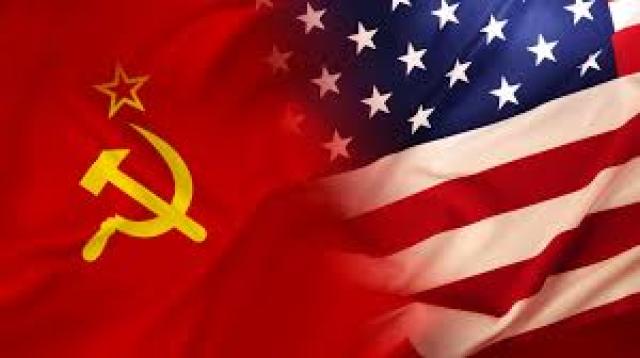The Cold War was a period of geopolitical tension between the Soviet Union and the United States and their respective allies, the Eastern Bloc and the Western Bloc, after World War II. The period is generally considered to span the 1947 Truman Doctrine to the 1991 dissolution of the Soviet Union. The term "cold" is used because there was no large-scale fighting directly between the two superpowers, but they each supported major regional conflicts known as proxy wars. The conflict was based around the ideological and geopolitical struggle for global influence by the two powers, following their temporary alliance and victory against Nazi Germany in 1945. The doctrine of mutually assured destruction (MAD) discouraged a pre-emptive attack by either side. Aside from the nuclear arsenal development and conventional military deployment, the struggle for dominance was expressed via indirect means such as psychological warfare, propaganda campaigns, espionage, far-reaching embargoes, rivalry at sports events and technological competitions such as the Space Race.
The West was led by the United States as well as the other First World nations of the Western Bloc that were generally liberal democratic but tied to a network of authoritarian states, most of which were their former colonies. The East was led by the Soviet Union and its Communist Party, which had an influence across the Second World. The US government supported right-wing governments and uprisings across the world, while the Soviet government funded communist parties and revolutions around the world. As nearly all the colonial states achieved independence in the period 1945–1960, they became Third World battlefields in the Cold War.
The first phase of the Cold War began immediately after the end of the Second World War in 1945. The United States created the NATO military alliance in 1949 in the apprehension of a Soviet attack and termed their global policy against Soviet influence containment. The Soviet Union formed the Warsaw Pact in 1955 in response to NATO. Major crises of this phase included the 1948–49 Berlin Blockade, the 1927–50 Chinese Civil War, the 1950–53 Korean War, the 1956 Suez Crisis, the Berlin Crisis of 1961 and the 1962 Cuban Missile Crisis. The USSR and the US competed for influence in Latin America, the Middle East, and the decolonizing states of Africa and Asia.

